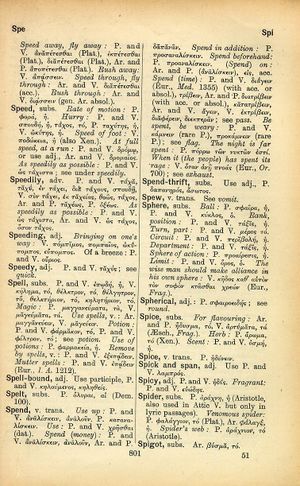spend: Difference between revisions
ὁ ναύτης ὁ ἐν τῇ νηῒ μένων βούλεται τοὺς τέτταρας φίλους ἰδεῖν → the sailor staying on the ship wants to see his four friends
(Woodhouse 4) |
(CSV5) |
||
| Line 1: | Line 1: | ||
{{ | {{Woodhouse1 | ||
| | |Text=[[File:woodhouse_801.jpg|thumb|link={{filepath:woodhouse_801.jpg}}]]'''v. trans.''' | ||
<b class="b2">Use up</b>: P. and V. ἀναλίσκειν, ἀναλοῦν. P. καταναλίσκειν. Use: P. and V. χρῆσθαι (dat.). | |||
<b class="b2">Spend</b> (<b class="b2">money</b>): P. and V. ἀναλίσκειν, ἀναλοῦν, Ar. and P. δαπανᾶν. | |||
<b class="b2">Spend in addition</b>: P. προσαναλίσκειν. | |||
<b class="b2">Spend beforehand</b>: P. προαναλίσκειν. | |||
(<b class="b2">Spend</b>) <b class="b2">on</b>: Ar. and P. (ἀναλίσκειν), εἰς, acc. | |||
<b class="b2">Spend</b> (<b class="b2">time</b>): P. and V. διάγειν (Eur., ''Med.'' 1355) (with acc. or absol.), τρίβειν, Ar. and P. διατρίβειν (with acc. or absol.), κατατρίβειν, Ar. and V. [[ἄγω|ἄγειν]], V. ἐκτρίβειν, [[διαφέρω|διαφέρειν]], διεκπερᾶν; see pass. | |||
<b class="b2">Be spent, be weary</b>: P. and V. κάμνειν (rare P.), προκάμνειν (rare P.); see [[flag]]. | |||
<b class="b2">The night is far spent</b>: P. [[πόρρω]] τῶν νυκτῶν ἐστί. | |||
<b class="b2">When it</b> (<b class="b2">the people</b>) <b class="b2">has spent its rage</b>: V. [[ὅταν]] ἀνῇ πνοάς (Eur., ''Or.'' 700); see [[exhaust]]. | |||
}} | }} | ||
Revision as of 10:04, 21 July 2017
English > Greek (Woodhouse)
v. trans.
Use up: P. and V. ἀναλίσκειν, ἀναλοῦν. P. καταναλίσκειν. Use: P. and V. χρῆσθαι (dat.).
Spend (money): P. and V. ἀναλίσκειν, ἀναλοῦν, Ar. and P. δαπανᾶν.
Spend in addition: P. προσαναλίσκειν.
Spend beforehand: P. προαναλίσκειν.
(Spend) on: Ar. and P. (ἀναλίσκειν), εἰς, acc.
Spend (time): P. and V. διάγειν (Eur., Med. 1355) (with acc. or absol.), τρίβειν, Ar. and P. διατρίβειν (with acc. or absol.), κατατρίβειν, Ar. and V. ἄγειν, V. ἐκτρίβειν, διαφέρειν, διεκπερᾶν; see pass.
Be spent, be weary: P. and V. κάμνειν (rare P.), προκάμνειν (rare P.); see flag.
The night is far spent: P. πόρρω τῶν νυκτῶν ἐστί.
When it (the people) has spent its rage: V. ὅταν ἀνῇ πνοάς (Eur., Or. 700); see exhaust.

